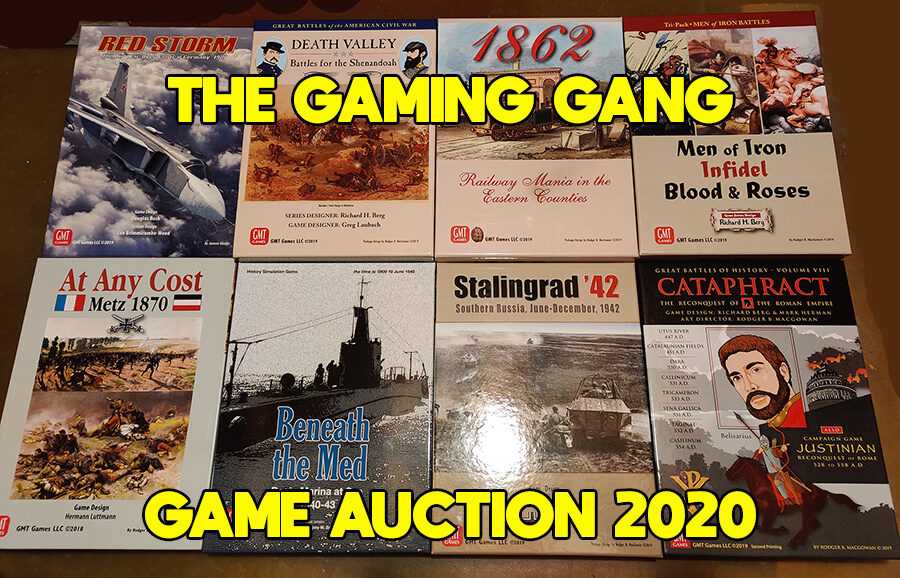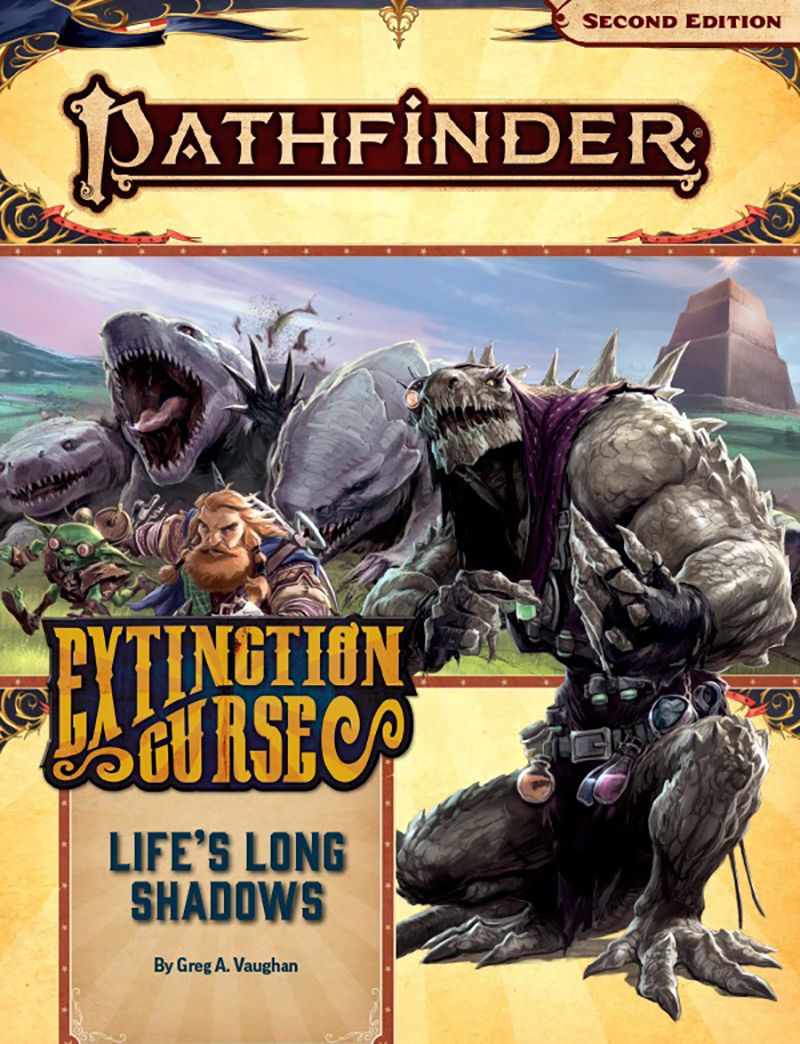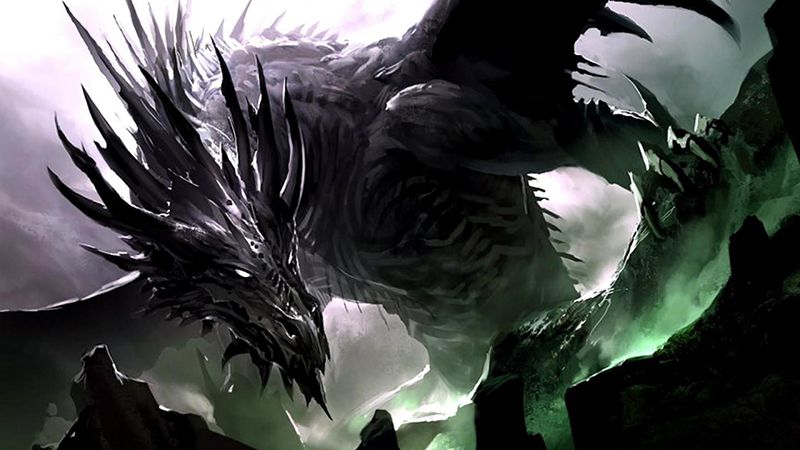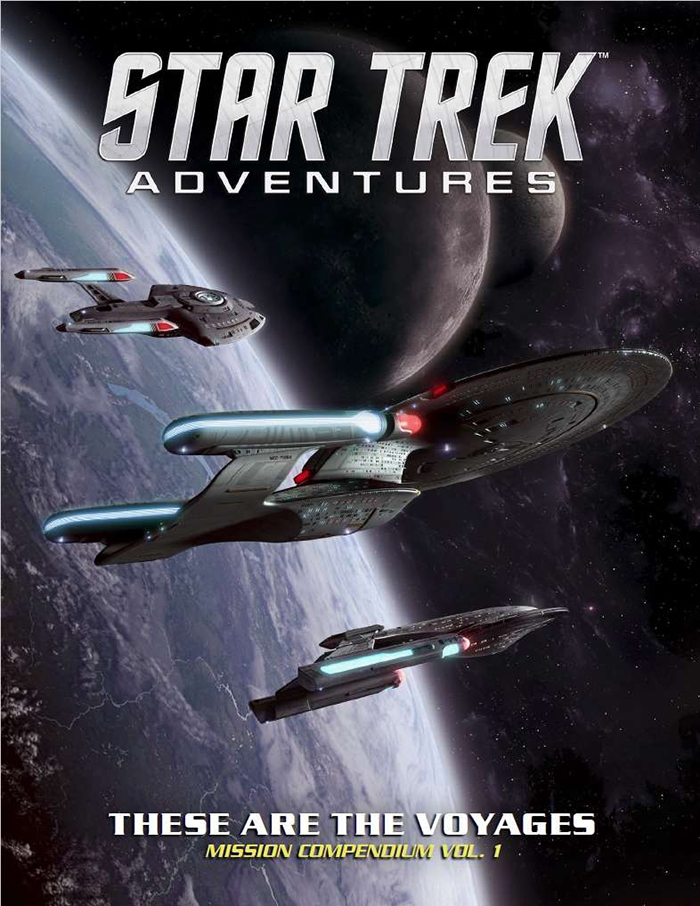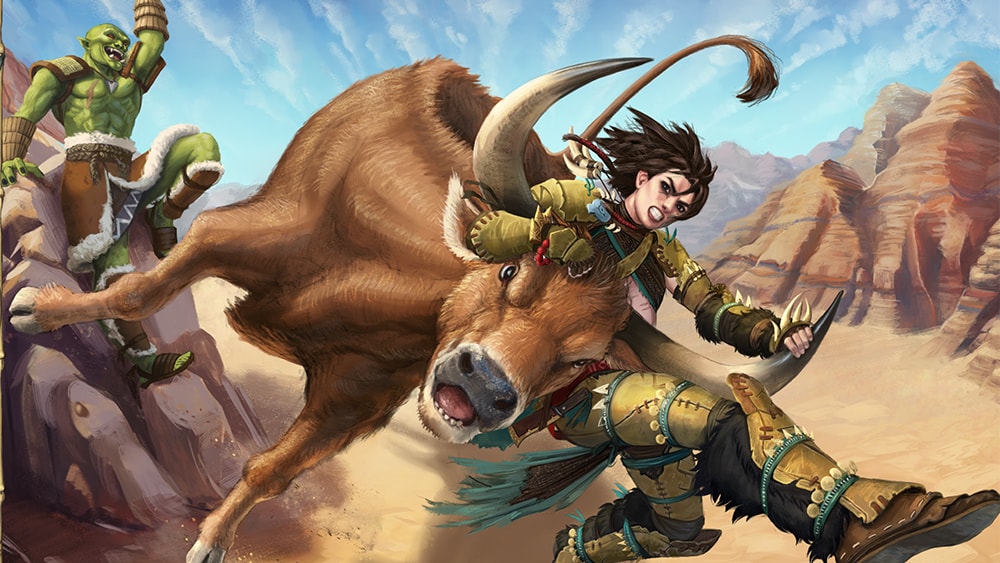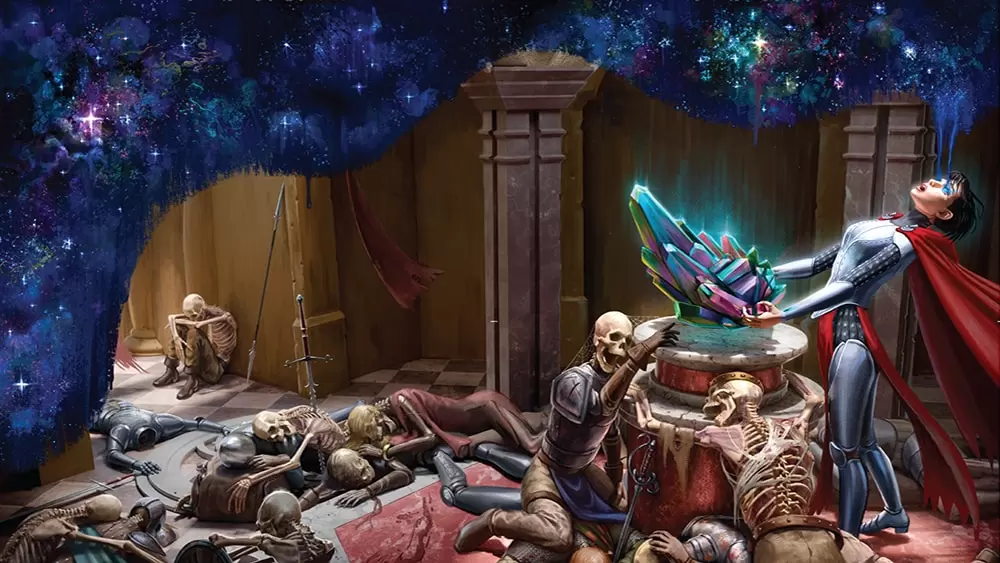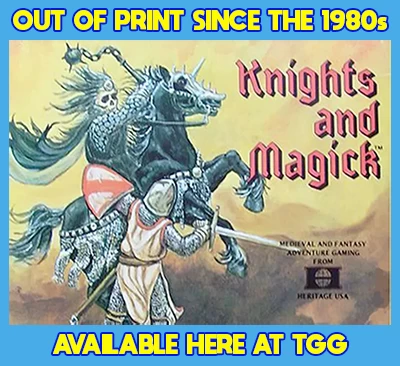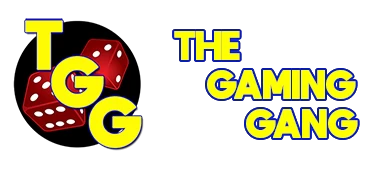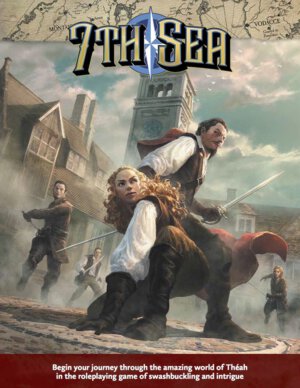
Publisher: John Wick Presents
Authors: John Wick, Mike Curry, Rob Justice, Mark Diaz Truman, and Jesse Heinig
Artists: Giorgio Baroni, Manuel Castañón Guerrero, El Tio Drake, Shen Fei, Young Yi Lee, Diego Rodriguez, Beth Sobel, and Meagan Trott
Year: 2016
Players: It’s an RPG so two or more
Ages: 14+ (Just my opinion but read the review for details)
Playing Time: Ongoing
Genre: Swashbuckling adventure RPG
Pages: 304 pages
Retail Price: PDF $24.99 through DriveThruRPG (remember a small portion of your purchase helps support TGG); Hardcover $59.99–$99.99
Outside the Box
I always appreciate having the opportunity to review roleplaying games because, for the most part, my earliest introduction to table top gaming was by way of RPGs and I still can’t get enough of them. I also happen to love when games – which haven’t been available for years – get more than simply a new coat of paint in order to see the light of day again; even more so when we’re talking about something which was originally very well received in its day. Better still when I’m completely unfamiliar with the previous releases so the new edition is completely fresh for me and don’t have any reason for grumbling about changes to a beloved system.
For the uninitiated 7th Sea was originally published by AEG in 1999 and went on to win the Origins Award for best new RPG the following year. After a pretty successful run, including numerous supplements expanding upon the game world, support dried up for the system and the game went out of print in 2005. Following the decision our friends at AEG made in 2015 to divest themselves of their RPG lines, original designer John Wick stepped in to acquire the full rights for the game and took to Kickstarter to finance a new edition. $1.31 million later a revamped 7th Seas came about and began making its way into backers’ hands this past August.
The setting of 7th Sea draws plenty of inspiration not only from 17th Century European history but also loads of fiction set during that period; ala The Scarlet Pimpernel, The Three Musketeers, Treasure Island, and more. The fictional counterparts of historical nations are similar enough so even someone with a passing idea of what the Age of Sail was will recognize Avalon as England. Each of the nations also have plenty of fictionalized trappings so players won’t feel as they’ve been ported into a bland, whitewashed history lesson disguised by a modicum of fantasy window dressing. While the title is 7th Sea there’s plenty in the game books outside of playing pirates and shivering your timbers. Sure, you can play pirates if you’d like but there’s a whole world of opportunity for other characters as well.
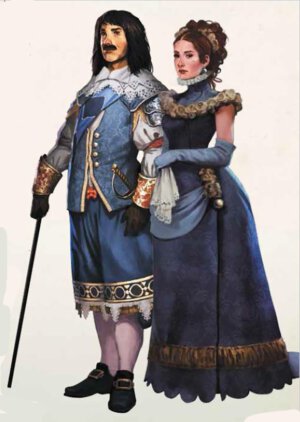
So let’s get down to it…
Normally, I’d begin by mentioning the quality of production but since John Wick Presents was kind enough to ship me a physical copy you can see from the video above the new edition of 7th sea is top notch. The core book is filled with enough artwork to get the old creative juices flowing while still providing a solid word count so one doesn’t feel as if they’re being cheated out of gaming material. I have to say this is one of the nicer looking RPG products to come out in the past year or so. I also appreciate the underlying them of inclusion which subtly runs throughout the book; especially in the artwork various ethnic groups and women tend to be equally represented and there are even two rather innocent images of same sex romance as well. Also keep in mind this is pseudo-historical-fantasy setting so there’s no built in racial or gender discrimination already baked into the setting.
The opening one hundred or so pages of the core book dives into the world of Theah and many of the countries the adventurers will travel. Details about such things as the lands themselves, military, societal mores, possible intrigues and more are covered. Some readers might be surprised to find this info presented so early in the book but I found it went a long way into piquing my interest in the game world.
Creating the heroes gets covered next and creating a character and the process is fairly simply overall. There are no classes in 7th Sea so players are tasked with creating a concept for their characters. To piece together your concept a list of twenty questions are provided to help define who you want your hero to be. If you want to channel your inner Johnny Depp to play a character like Cap’n Jack Sparrow you certainly can. If a smooth talking charmer, who revels in unraveling the latest court intrigue, is more your style you can surely go in that direction as well; the sorts of characters available to the players is completely open ended. If a particular skill or trait is best suited for the type of adventurer you want all it takes is a simple conversation with the GM to hash out the details.
Each hero is built upon traits (Brawn, Finesse, Resolve, Wits, and Panache), a nationality (which provides bonuses, backgrounds, and advantages), skills, advantages, and arcana (a hubris and a virtue which allow for gaining hero points with good roleplaying) in order to create a believable alter ego. While it might seem as if there’s quite a lot to tackle in the creation, the reality is much of what you’re looking to accomplish in crafting a hero has already been taken care of in the concept so the rest is really just piecing things together. 7th Sea is certainly not a game for those who love to invest a lot of time and effort min/maxing that’s for sure.
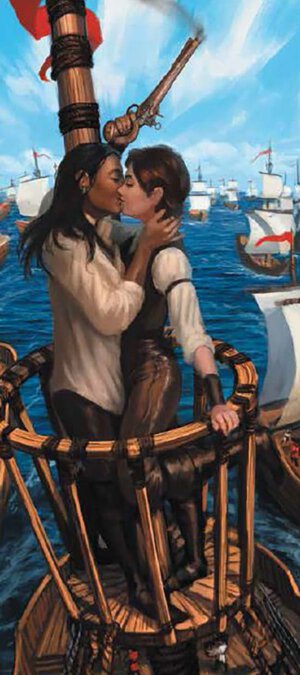
Basically the GM will present the situation and the player will spend their raises in order to perform actions and resolve what’s in front of them. An example could be fleeing into a forest while being hotly pursued by a detachment of the Queen’s guards. He player may take an approach of using agility+hide to create their dice pool. The guards are obviously stopping to fire their muskets so the GM may tell the player they’ll need to spend raises to 1) outdistance the guards, 2) dodge their sporadic fire so the character doesn’t take damage, and 3) find a suitable hiding place quickly. If the player isn’t lucky enough to roll three raises they’ll get to choose what actions they were able to successfully pull off and deal with the consequences of what they couldn’t.
This method of resolution is pretty easy once you get the gist of it but I do want to mention a lot of responsibility falls on shoulders of the GM. 7th Sea is more of a sandbox set of rules so it isn’t as if the core book is filled with tons of examples for the GM to lean upon. Still, I like the free flowing vibe to the proceedings, as the system is certainly geared toward storytelling as opposed to loading players with an overwhelming amount of crunch designed to cover every situation.
Another aspect of 7th Sea which bears mention is the character advancement. This isn’t a system which utilizes experience points so this can come as a bit of a shock to gamers who are transitioning from an old school style game like D&D. Granted, each character will have “stories” which they’re hoping to complete (that’s really the only way to improve) but these can vary wildly based on what the player has concocted; one character might be trying to find a lost relative while another may be aiming to bring down a pirate king through guile; each resolution would net wildly different gains due to their complexities so this can be rather tricky since most people like to see some sort of advancement taking place at least every session or two. Depending on the difficulty of the story a player creates the end payoff could turn out be huge improvements to their character although it very likely will be a long time before they actually earn that payoff. Personally, I’d do some tweaking with this for my own games.
Since the title of the game is 7th Sea there has to be rules covering seafaring right? Of course there are and, although they turn out to be less than twenty pages, the rules covering ships and sea battles are interesting and to the point. As with much of 7th Sea, the aim is in creating exciting stories so there’s no deep dive into the minutia of life at sea, cannon poundage, naval ship rating, or the like. If you’d like to learn more about the difference between a jigger mast and a Bonaventure mizzen or details on tacking you’ll not find that info here and that’s certainly fine since none of that is important in the great scheme.
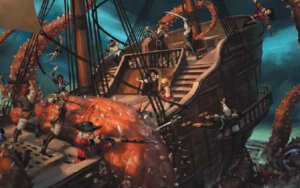
Overall, I really like the new edition of 7th Sea and feel it should make a good addition of many roleplayers’ collections. The book is first rate and there are a lot of good ideas which could even be cribbed by clever GMs to utilize in other games. I do want to point out 7th Sea is probably better suited for game masters who have a bit of experience under their belts (or maybe I should say have established their sea legs) since the core rules really equate to a sandbox style of gaming; implementation of many of the mechanics, such as risks, is done so much on the fly I could see it becoming very easy for newer GMs to very quickly find themselves overwhelmed and start to founder. Sadly, the game master section is less than thirty pages nor is there a starting adventure included to ease a newbie into the proceedings.
I certainly don’t want to dissuade new gamers from checking out 7th Sea though since it really is a fine product with plenty of great material. It’s also possible some of the concepts long time roleplayers will find somewhat alien, character advancement as an example, will be easier to grasp for those who aren’t firmly vested in XP gains from other systems. I’m a bit up in the air but newer gamers out there are certainly more aware of their own GM capabilities than I ever could.
Regardless, if you’re interested in playing swashbuckling adventures – in a mighty interesting pseudohistorical-fantasy setting you should really give serious consideration at looking at 7th Sea. I can’t tell you how pleased long time fans of the system will be with the revamp but, for someone who came in with a fresh perspective, I found a lot to like about the core book. Now I’ll be looking forward to the slew of supplements sure to follow (two are already out in PDF: Heroes & Villains and Pirate Nations) since I’ve very curious to see much more of the land of Theah.
- One Mother of an Adventure! Symbaroum – Symbar: Mother of Darkness Reviewed - Nov 22, 2024
- The Terror Beneath Horror RPG is Out in Print and PDF - Nov 22, 2024
- Ashes Without Number Roleplaying Game is Up on Kickstarter - Nov 22, 2024



